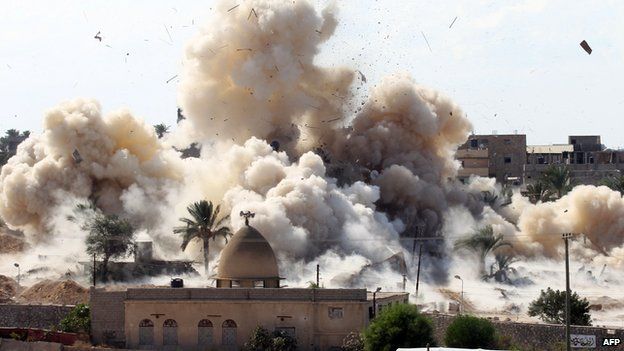Egypt demolishes Sinai homes for Gaza border buffer
- Published

Egypt has begun demolishing homes along its border with the Gaza Strip as part of a planned 500m buffer zone that is intended to prevent weapons smuggling.
Residents living along the border with the Palestinian territory have been given 48 hours - and promised compensation - to leave their homes.
The buffer will include water-filled trenches to prevent tunnelling.
Egyptian media accuses Gaza's Hamas administration of aiding militants in Sinai. Hamas denies the charge.
Last week, more than 30 Egyptian soldiers were killed in a militant bomb attack on an army post in Sinai.
After the bombing, Egyptian President Abdul Fattah al-Sisi passed a law authorising the military to protect state facilities - including power plants, main roads and bridges.
He also declared a three-month state of emergency in Sinai. Critics of the move said it allows the army to return to the streets and brings back military trials for civilians.
The planned buffer zone will reportedly stretch along the length of the 13km (eight mile) border.
Those who refuse to leave their homes within the deadline set by the authorities will have their property seized by force.
North Sinai's governor, General Abdel-Fattah Harhoor, said on Wednesday that 800 homes in the border city of Rafah had been evacuated.
Compensation has been offered to the displaced, except those whose homes are found to contain smuggling tunnels.
Some residents have complained that the government's action is breeding anger. Forcible displacement is a criminal act under the Egyptian constitution.
Militants operating in Sinai and in Gaza have been accused of using tunnels below the border to move weapons and fighters.
The tunnels have also played a vital role in the economy of the Palestinian territory, which has been struggling to cope with a blockade imposed by Israel and Egypt in 2007 as a measure against Hamas.